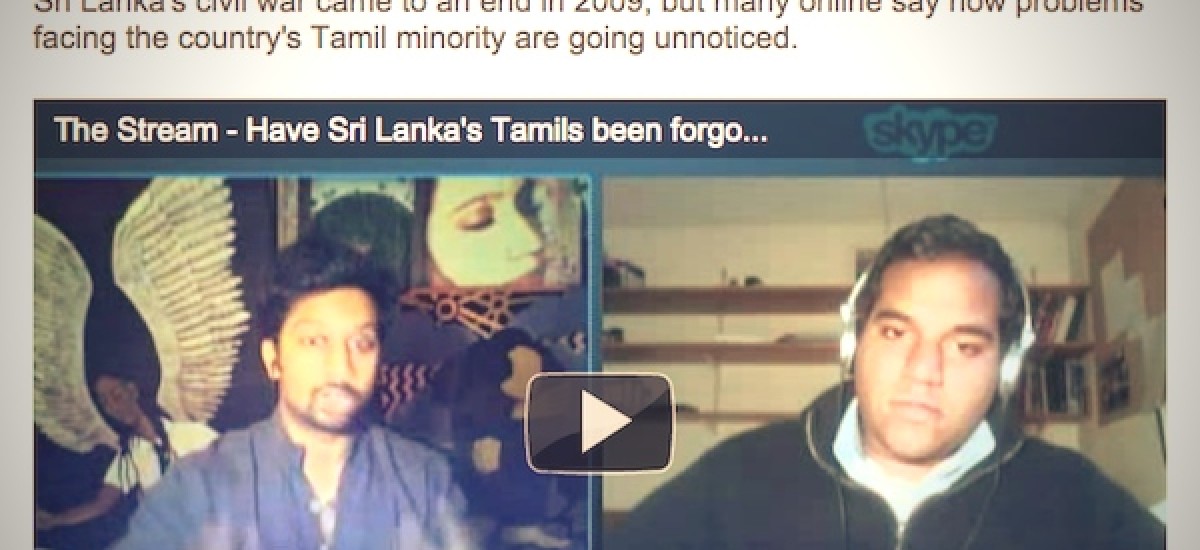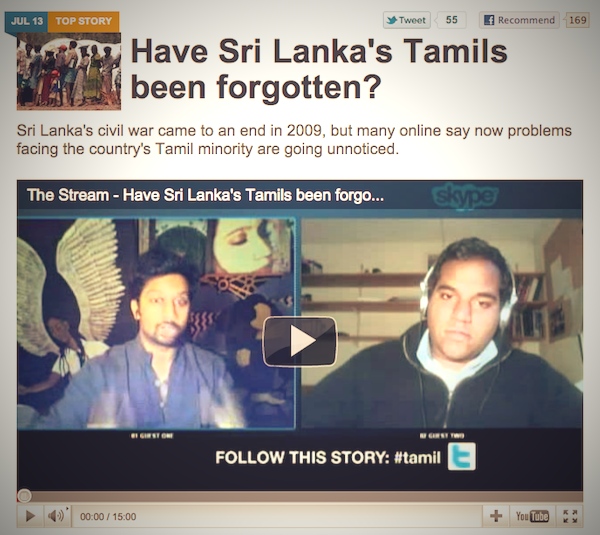Since the nation’s much-celebrated war victory, countless references have been made of our potential to become the Wonder of Asia. Is this mere hyperbole? Do we really have what it takes to become a prosperous, modern nation on par with emerging Asian superpowers like Singapore and Malaysia? Seneviratne’s candid response to this question is: “We are on our way to Zimbabwe, not Singapore.” – Prof. H. L. Seneviratne, Professor Emeritus of Anthropology at the University of Virginia, Lanka Monthly Digest, June 2011
Well, neighbourhood worries me a great deal, quite frankly you have a situation in Sri Lanka. The decimation of the LTTE was something which is good. But the Tamil problem does not disappear, with the defeat of the LTTE. The Tamil population has legitimate grievances. They feel they are reduced to second-class citizens. And our emphasis has been to persuade the Sri Lankan government that we must move towards a new system of institutional reforms, where the Tamil people will have a feeling that they are equal citizens of Sri Lanka, and they can lead a life of dignity and self-respect. It is not easy. Within Sri Lanka’s population, there are hotheads, the Sinhala chauvinism is a reality. – Indian Prime Minister Manmohan Singh, June 2011
A regular contributor and commentator on Groundviews, R.K. Guruparan took part in a televised debate, conducted via Skype, first broadcast on Al Jazeera’s programme ‘The Stream’ on 13 July. The other person featured in the video, whose Skype connection curiously failed at about the same time the questions posed to him were getting harder, most recently took the entire theory of Galtung’s structural violence and bizarrely, yet revealingly, equated it to damaging to ‘parking pillars’. This gentleman’s fundamental position and weltanschauung is clearly revealed in a comment posted after his appearance on The Stream, noting that “I don’t see why Tamils want a special victim card and what they would get with it.”
The episode’s webpage, at the time of writing, features over 25 comments. The page has also been shared over 160 times on Facebook and retweeted over 55 times. Anchored to the large following of both featured guests on Facebook, Twitter and their respective blogs, though the actual views of their 15 minute programme segment on YouTube are surprisingly low (just 601 at the time of writing) there is a lot of conversation about the substance of the programme and the issues it raised on the web. Exceedingly frustrating is the scattered nature of these debates. In the minutes and hours after the broadcast, most of the exchanges occurred over Twitter. Over the next day, several blog posts were published on the programme. Conversations over multiple individual accounts and fan pages on Facebook have taken also place. Of these, the blog posts are the most widely accessible. Facebook is just impossible to curate or collate, because no single person would be friends with all of the 166+ accounts that have shared this article to date, making it impossible to ascertain the general timbre of the debate. Twitter offers its own set of challenges for archival and curation. The most interesting conversations have occurred between the following accounts,
- rkguruparan (Featured guest)
- indica (Featured guest)
- romesh_h
- aufidius
- nirananketell
- teearuna
- rizajazeel
Sadly, there’s no tool on the web that allows the easy curation of Twitter conversations spread across multiple accounts. What we’ve done is to capture some of the tweets using the web service Bundlr and present them as an archive of some of the leitmotifs in the debate this programme inspired. romesh_h, who is featured Groundviews, had the most exchanges with rkguruparan. nirananketell had the most exchanges with indica. aufidius addressed most of tweets to both rkguruparan and indica, for example, noting that “‘Better Island’ doesn’t necessarily come about with an ‘Island’ approach when communities face issues as communities”. rizajazeel is a much loved and well known blogger based in London, and teearuna based his observations on a recent essay by Prof. Michael Roberts published on Groundviews, which champions the concept of the ‘ecumenical Sri Lankan‘. The twitter exchanges between these seven accounts alone flag serious challenges to how we think about reconciliation and identity in post-war Sri Lanka, and worth engaging with constructively for precisely the same reason.
There is also one tweet, addressed to rkguruparan from the account of an individual included in our Bundlr bundle to underscore what the Indian PM referred to as a significant problem in post-war Sri Lanka – Sinhala chauvinism. @gihangamos, who we have learned through our own exchanges on Twitter is racist, notes in his first comment that rkguruparan “promoted that #killingfields poster on the roads in the UK”. The denigration continues in a second tweet, again addressed to rkguruparan, noting that “I am interested in buying some land in North,u know a good contact? Already got few in Hambantota, need some from Jaffna too :)” And that is the sum total of @gihangamos‘s contribution to the debate. Rather than fringe lunacy, what is disturbing – and to varying degrees, reflected in the sentiments of others who don’t see the problems Tamil face in Sri Lanka as distinct from shared and growing concerns over illiberal governance – is that this reflects the sensibilities of a larger community. Glib apologists for this community, out of callous ignorance or malevolent deceit, have the chutzpah to suggest that a Sinhala majority which supports the 18th Amendment, partook in the monumental waste of food to celebrate the second term of a President, continue to force Tamils into submission, continue to treat them as somehow suspect, countenances violent attacks in broad daylight against Tamil MPs and supports a government whose senior ministers openly call the Tamil version of the national anthem a joke is really able, through essentially the imposition of a soi-disant ‘Sri Lankan’ identity, address the enduring problems of systemic racism, post-war.
Will “working together” to acknowledge and address legitimate Tamil grievances – as indica seems to suggest should somehow and magically occur in a comment left on rizajazeel‘s blog (The Guru vs Indi Fight Debate) – given a majority mindset of this nature stand any chance of success? Alternatives and ideas welcome.


